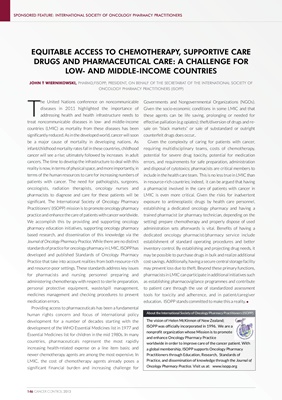
SPONSORED FEATURE: INTERNATIONAL SOCIETY OF ONCOLOGY PHARMACY PRACTITIONERS
EQUITABLE ACCESS TO CHEMOTHERAPY, SUPPORTIVE CARE
DRUGS AND PHARMACEUTICAL CARE: A CHALLENGE FOR
LOW- AND MIDDLE-INCOME COUNTRIES
JOHN T WIERNIKOWSKI, PHARMD,FISOPP; PRESIDENT, ON BEHALF OF THE SECRETARIAT OF THE INTERNATIONAL SOCIETY OF
ONCOLOGY PHARMACY PRACTITIONERS (ISOPP)
T
he United Nations conference on noncommunicable Governments and Nongovernmental Organizations (NGOs).
diseases in 2011 highlighted the importance of Given the socio-economic conditions in some LMIC and that
addressing health and health infrastructure needs to these agents can be life saving, prolonging or needed for
treat noncommunicable diseases in low- and middle-income effective palliation (e.g opiates); theft/diversion of drugs and re-
countries (LMIC) as mortality from these diseases has been sale on “black markets” or sale of substandard or outright
significantly reduced. As in the developed world, cancer will soon counterfeit drugs does occur..
be a major cause of mortality in developing nations. As Given the complexity of caring for patients with cancer,
infant/childhood mortality rates fall in these countries, childhood requiring multidisciplinary teams, costs of chemotherapy,
cancer will see a rise; ultimately followed by increases in adult potential for severe drug toxicity, potential for medication
cancers. The time to develop the infrastructure to deal with this errors, and requirements for safe preparation, administration
reality is now, in terms of physical space, and more importantly, in and disposal of cytotoxics; pharmacists are critical members to
terms of the human resources to care for increasing numbers of include in the health care team. This is no less true in LMIC than
patients with cancer. The need for pathologists, surgeons, in resource-rich countries; indeed, it can be argued that having
oncologists, radiation therapists, oncology nurses and a pharmacist involved in the care of patients with cancer in
pharmacists to diagnose and care for these patients will be LMIC is even more critical. Given the risks for inadvertent
significant. The International Society of Oncology Pharmacy exposure to antineoplastic drugs by health care personnel,
Practitioners’ (ISOPP) mission is to promote oncology pharmacy establishing a dedicated oncology pharmacy and having a
practice and enhance the care of patients with cancer worldwide. trained pharmacist (or pharmacy technician, depending on the
We accomplish this by providing and supporting oncology setting) prepare chemotherapy and properly dispose of used
pharmacy education initiatives, supporting oncology pharmacy administration sets afterwards is vital. Benefits of having a
based research, and dissemination of this knowledge via the dedicated oncology pharmacist/pharmacy service include
Journal of Oncology Pharmacy Practice. While there are no distinct establishment of standard operating procedures and better
standards of practice for oncology pharmacy in LMIC, ISOPP has inventory control. By establishing and projecting drug needs, it
developed and published Standards of Oncology Pharmacy may be possible to purchase drugs in bulk and realize additional
Practice that take into account realities from both resource-rich cost savings. Additionally, having a secure central storage facility
and resource-poor settings. These standards address key issues may prevent loss due to theft. Beyond these primary functions,
for pharmacists and nursing personnel preparing and pharmacists in LMIC can participate in additional initiatives such
administering chemotherapy with respect to sterile preparation, as establishing pharmacovigilance programmes and contribute
personal protective equipment, waste/spill management, to patient care through the use of standardized assessment
medicines management and checking procedures to prevent tools for toxicity and adherence, and in patient/caregiver
medication errors. education. ISOPP stands committed to make this a reality. l
Providing access to pharmaceuticals has been a fundamental
About the International Society of Oncology Pharmacy Practitioners (ISOPP)
human rights concern and focus of international policy
development for a number of decades starting with the The vision of Helen McKinnon of New Zealand;
development of the WHO Essential Medicines list in 1977 and ISOPP was officially incorporated in 1996. We are a
nonprofit organization whose Mission is to promote
Essential Medicines list for children in the mid 1980s. In many
and enhance Oncology Pharmacy Practice
countries, pharmaceuticals represent the most rapidly worldwide in order to improve care of the cancer patient. With
increasing health-related expense on a line item basis; and a global membership, ISOPP supports Oncology Pharmacy
newer chemotherapy agents are among the most expensive. In Practitioners through Education, Research, Standards of
LMIC, the cost of chemotherapy agents already poses a Practice, and dissemination of knowledge through the Journal of
significant financial burden and increasing challenge for Oncology Pharmacy Practice. Visit us at: www.isopp.org
146 CANCER CONTROL 2013